
|
Ashes of Time
|
by Russil Wvong
Hong Kong/China, 1994
Hong Kong Release Date: 1994/09/15
Running Time: 1:40
Cast: Leslie Cheung, Tony Leung Kar-Fai, Brigitte Lin, Tony Leung Chiu-Wai,
Carina Lau, Charlie Yeung, Jacky Cheung
Director: Wong Kar-Wai
Screenplay: Wong Kar-Wai based on characters from the novel
"The Eagle-Shooting Heroes" by Jin Yong
Cinematography: Christopher Doyle
Action Director: Sammo Hung
Of all the movies I've seen, if I had to pick one as my favorite,
it'd be Ashes of Time. It's hard for me to explain exactly why,
though.
Despite several spectacular action sequences, stunning
cinematography, and eight of Hong Kong's best-known and
most charismatic actors, it's not a very accessible movie.
Lots of people hate it.
The video store clerk where I first rented the
movie felt compelled to warn me that "it's not an action movie."
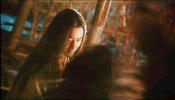
| |
|
Leslie Cheung as Ouyang Feng
| |
Some things in the movie are easy to understand; others are
completely opaque. At a straightforward level, there's
the beautiful images of the desert, filmed by Christopher
Doyle. The amazing fight scenes, choreographed by
Sammo Hung, are filmed in stop-motion, so that they appear
as a continuous blur of action.
The next thing that's striking is the narrator's overwhelming
sense of desolation and regret, contrasted against the other
characters: insanity, grief, recklessness, self-destruction.
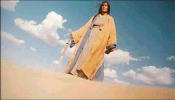
| |
|
Tony Leung Kar-Fai as Huang Yaoshi
| |
The next question is,
who are all these people? In contrast to the plodding
explanations of a TV
episode, Ashes of Time shows us characters without
telling us who they are until much later. (A character
is typically introduced by showing him battling a horde
of enemies.) And there's a lot
of characters to keep straight; it's easy to get confused,
particularly if you're not familiar with the actors.
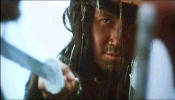
| |
|
Jacky Cheung as Hong Qi
| |
Three of the central characters are taken from "The Eagle-Shooting
Heroes", a famous martial-arts novel by Jin Yong. In the novel,
which takes place decades after the movie, they're powerful
lords, the best swordsmen in the martial arts
world; in Ashes of Time,
they're still young men, out to make names
for themselves. The narrator, Ouyang Feng (played by Leslie
Cheung), will later be known as the Poisonous West, synonymous
with corruption and death. Huang Yaoshi (Tony Leung Kar-Fai),
reckless but an equally
formidable swordsman, will retire to Peach Blossom Island and
be known as the Evil East. Hong Qi (Jacky Cheung) will become
the nine-fingered Northern Beggar, leader of the Beggar Clan,
and will eventually kill Ouyang Feng in battle.
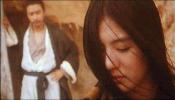
| |
|
Charlie Yeung
| |
It's interesting to contrast these three characters. Ouyang
Feng is a sympathetic character, despite his later reputation.
He's willing to help other people, or to offer them advice,
as long as it doesn't cost him anything. His flaw is his
cold-bloodedness: he proceeds by
calculation, refusing to put himself at risk unless it's
profitable. He flatly refuses to help a peasant girl (Charlie
Yeung) avenge her brother's death, because she's unable to
pay him. Later, he realizes that he has rejected other
people -- in particular, his brother's wife (an uncredited
Maggie Cheung) -- in order to protect himself. Ouyang Feng's
story is what gives Ashes of Time its sense of tragedy.
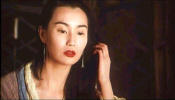
| |
|
Maggie Cheung
| |
By contrast, Huang Yaoshi (Tony Leung Kar-Fai) is careless,
even irresponsible, taking risks with his life on a whim.
He's willing to abandon a woman who's fallen in love with him
(Brigitte Lin), or to seduce his best friend's wife
(Carina Lau). Eventually, he withdraws from the
world, blotting out his memories and retiring to an island.
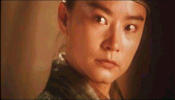
| |
|
Brigitte Lin
| |
Hong Qi (Jacky Cheung) is the most optimistic of these
characters. Ouyang Feng describes him as a "simple man":
he's willing to put his life at risk because someone needs
his help, not because there's money in it. Like Ouyang,
he's motivated by ambition -- he wants to make a name for
himself -- but he also has a conscience, and in
the end, he becomes a force for good. In "The Eagle-Shooting
Heroes",
he battles Ouyang Feng several times, and eventually
kills him.
Besides these three, there's two other characters who can
be contrasted with Ouyang Feng. Brigitte Lin plays a young woman
disguised as a man, Murong Yang. Later, she will become known as
the Defeat-Seeking Loner, a legendary swordsman who will never
be defeated. She takes refuge in insanity after
Huang Yaoshi abandons her.
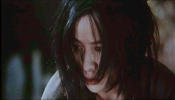
| |
|
Carina Lau
| |
Tony Leung Chiu-Wai plays Huang Yaoshi's former best friend,
a swordsman who is now going blind. Since the blind swordsman's
wife (Carina Lau) fell in love with Huang, they're no
longer friends. Unlike Ouyang Feng, the blind swordsman is
consumed with bitterness and destructiveness, rather than
simply detachment.
Understanding the characters and the relationships between
them is remarkably complex, but understanding what's going on
isn't particularly easy, either. The plot is episodic and
non-linear. The closest thing that comes to mind in American
movies is Pulp Fiction, with its three interlocking stories.
Even there, though, each of the stories had a clearly defined
arc. Here, the emphasis isn't on what happens, it's on the
characters themselves: the focus shifts from Ouyang Feng and
Huang Yaoshi to Murong Yang, then to
the blind swordsman, then Hong Qi, and finally returns to
Huang Yaoshi and Ouyang Feng.
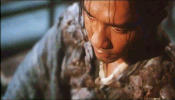
| |
|
Tony Leung Chiu-Wai
| |
Time jumps both backward and
forward -- not carelessly or randomly, but in such a way as
to unfold the story of each character. In many instances,
the full implications of what we see only becomes apparent
later. The first time I saw Ashes of Time,
I immediately rewound it and watched it again. It was the
only way I could make sense of what I had seen the first time.
Overall, I can't claim to have anything approaching a full grasp
of the movie, because it seems to have so much depth to it.
It uses all sorts of unconventional and experimental techniques,
without being incoherent or confused: I get the sense that
the filmmakers know exactly what they wanted to say and how
they wanted to say it -- the carefully framed images, intercut
with one another, the
acting, the cryptic dialog, the ominous soundtrack, all form
a coherent whole -- but I don't know exactly what it means,
and I can't dissect it and figure out how it works.
Maybe that's why I've watched it so many times.
References
Hong Kong Cinema and
Internet Movie Database entries for Ashes of Time,
including reviews from other people.
Essays on Ashes of Time by
Wong Kar-Wai and
Hong Kong film critic
Li Chuek-to, from Lokman Tsui's
Wong Kar-Wai website.
Notes from alt.asian-movies
explaining some aspects of Jin Yong's novel "The Eagle-Shooting Heroes".
Jin Yong is a hugely popular novelist in the Chinese-speaking world;
Galen Jang has a
list of Jin Yong novels.
How to see it
If you want to see Ashes of Time, try the following:
- your local video store, if it has a large selection of foreign
films and knowledgeable staff. Wong Kar-Wai's Chungking
Express, which is much more accessible compared
to Ashes of Time, should be widely available.
(Quentin Tarantino released it in the US.)
- your local Chinese video store. You'll need to show them
the Chinese title:

- If you know what a Video CD is,
you can mail-order the Video CD from one of the
places listed in the Video CD FAQ.
I have a copy of the Video CD; the transfer, by Mei Ah,
is quite good.
- You might also keep an eye out for it at film festivals.
My brother saw it at the Vancouver International Film Festival
(he hated it!).
There's two releases on DVD, one by Mei Ah which has been out for
several months, and one by World Video which was just released in
October 1998. The
World Video release
is terrible, according to people on alt.asian-movies. The
Mei Ah
release is basically the same as the laserdisc release; I've got a
copy of it.
Update: Mark Morrison says
that Chinatown Video in Australia has just released Ashes of Time in PAL
format. (He wrote the liner notes!)
This page hosted by GeoCities. For your own free web page, visit www.geocities.com.
30 October 1998; updated 27 April 1999









